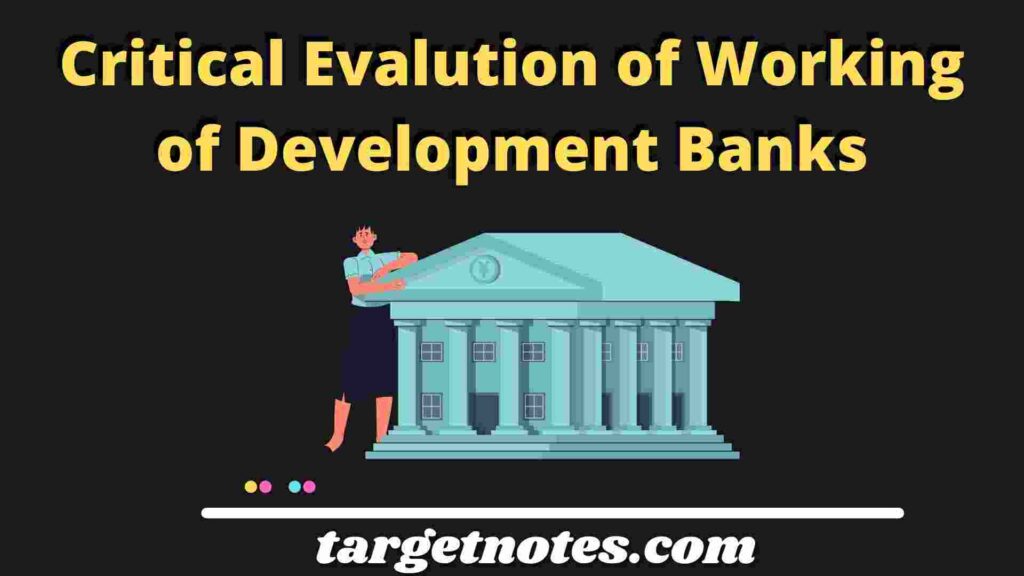
Critically evaluate the working of development banks in India.
Contents
Critical Evalution of Working of Development Banks
Development banks provide credit, term finance and financial services for the establishment of new projects as well as expansion, diversification, modernization and technology upgradation of the existing industrial enterprises in order to bring about industrial development in the country. It also provides several diversified financial products of non-project nature such as equipment finance, asset credit and equipment leasing, merchant banking, debenture trusteeship and forex services to the corporates. It functions as a development financing agency in its own right, in addition to its work of co ordinating, supplementing and monitoring the operations of other lending institutions in the country. Apart from providing direct assistance of the types supplied by the Industrial Finance Corporation of India and Industrial Credit and Investment Corporation of India, it provides indirect assistance in the Form of discounting long-term bills, refinancing of term loan and so on.
The Industrial Development Bank of India can now have public ownership upto 49 percent of its issued capital. The shareholding of the Government of India stands to about 58 percent in 2003. The Government of India introduced the Industrial Development Bank Bill, which is aimed a converting IDBI into a company under the Companies Act and to enable it to undertake banking business.
The financial assistance disbursed in different years has increased phenomenally. The assistance disbursed by nine major financial institution has increased from Rs. 98 crore in 1965-66 to Rs. 38,121 crore in 1996-97 and to Rs. 65,183 crore in 2000-01, after which it declined. These institution together supplied about Rs. 1,95,899 crore cumulatively till March 1996 Needless to add that the total amount of assistance given by all institution would be much higher than this amount. Each one of the institutions has experienced tremendous growth, although its share in the total growth has naturally been different.
The compound growth rate of the assistance disbursed by Industrial financial corporation of India was negative during 1990-91 to 2006-07 For other banks, although it has been positive, it has declined drastically during this period and annual growth rate of activity of select development financial institutions was negative and not impressive.
The net profits of the development banks have increased during 2003 04 to 2006-07 due increase in interest income. The net profits and operating profits have been positive and they have increased during 2004-05 to 2006-07 In the year 2006-07 interest income as percentage of working funds declined. The non-interest income to total assets ratio increased during 2006-07 to 1 percent at the aggregate level from 0.9 percent in the previous year. Operating profit as percentage of average working fund improved for IFCI and SIDB during 2006-07 as compared to the previous years.
The nominal rate of interest on public deposits has to higher for tax reason. Interest income received by the depositor from these banks is not eligible for tax concession. The rate of interest on deposits is usually between 18 to 20 percent. The public deposits are unsecured, more risky, less liquid and without any tax advantages. The practice of direct acceptance of deposit poses a threat to the working of credit policy because expenditures finance with these deposits fall outside the credit control mechanism of the central bank. Development banks are not very active in providing guarantees. number of banks are not providing guarantee in this area. There is competition with commercial banks who have day-to-day contact with the business and are more active in guarantee business.
It is also to be remembered that all the development banks are having large amount of non-performing assets whether all India or state level institutions and they are finding it increasingly difficult to recover their due both of principal and interest. Many loans even to big industrial houses have become sticky and bad, some of them are considered wilful defaulters.
Related Link
- Describe the various types of money
- Dynamic Functions of Money
- Evils or Demerits of Money
- Importance and significance of money in Modern Economy
- Approaches regarding Definitions of Money and its Function
- Money: Meaning, Definitions and features of Money
IMPORTANT LINK
- What is the Exchange Rate System in India?
- Evolution of foreign exchange market in India
- Meaning and importance of export finance.
- Role of Export-Import Bank in Financing India’s Foreign Trade
- How Commercial banks Export Finance to Overseas Importers?
- Explain packing credit in detail?
- What is Post-shipment credit?
- What is Pre-shipment or packing credit?
- Explain Export Credit in India?
- Institutions Providing Finance and Credit Facility for Foreign Trade
- What is Risk Analysis?
- Explain Political risks in detail? and its Types
- What are the types of Risks. Explain in detail?
- Meaning and Types of commercial risks
- How can we minimize foreign trade risks?
- What are Arbitrage operations?
- Difference between Spot Market and Forward Market
- What is spot exchange?
- Agency agreement: Meaning, Features and Advantages
- Functions of Foreign Exchange markets
- structure of Foreign exchange markets
Disclaimer






